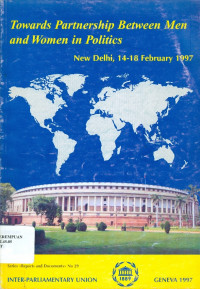
Text
Towards Partnership between Men and Women in Politics: New Delhi, 14-18 february 1997
Is partnership possible between men and women in politics ? Is it a source of more full-fledged and representative democracy ? How can it be achieved ? What benefit can society as a whole derive from this new way of imagining and conducting the political administration of countries ?
These are the questions which the Inter-Parliamentary Union asked us to debate and for which the Parliament of India, which is in the process of reflecting on this subject, invited you here to New Delhi.
All our work was naturally inspired by the results of the Fourth World Conference on Women which took place in Beijing in September 1995; our meeting was designed to maintain the momentum and ensure the implementation of the commitments made by Governments on that occasion. During our debates, we have extended and amplified the content of the Beijing Parliamentary Declaration and the IPU Plan of Action to correct present imbalance in the participation of men and women in political life.
During four days of intense debate, we pooled the diversity of our experiences, our reflections, our doubts and our suggestions. To nourish our discussions, the Inter-Parliamentary Union had provided a world comparative study and a poster entitled " Men and Women in Politics: Democracy Still in the Making ", which constitute an irreplaceable tool for reflection.
The Inter-Parliamentary Union and the Indian Parliament encouraged the formation of parity delegations. I am particularly proud to note that the 78 national delegations which participated in the Conference were composed of 121 men and 119 women. Never before to my knowledge has an international meeting achieved such a degree of parity, never before has a conference on a topic concerning women allowed such a dialogue between equals, not only in rights but also in numbers. As Speaker of a Parliament, I can only hope that all our Parliaments and our international meetings will, like this one, increasingly come to resemble our societies and take on a parity nature.
I also wish to point out that we had the chance to engage in a dialogue on this important question with men and women from the broadest spectrum of political and cultural backgrounds. 133 political parties were in fact represented at the Conference together with nine independents.
The presence and active participation of men and women representing several non-governmental organisations greatly enriched the debates of the Conference. The capital role which they play in the field to promote the establishment of parity democracy was highlighted on several occasions; they should therefore be encouraged and supported in the action they carry out in very diverse areas. In particular, we felt that it was essential for them to continue and strengthen their scrutiny of the political process.
Availability
| KP XXI.000211 | KP XXI INT t | My Library | Available |
Detail Information
- Series Title
-
Reports and Documents no. 29
- Call Number
-
KP XXI INT t
- Publisher
- Jenewa : Inter-Parliamentary Union., 1997
- Collation
-
136 hlm.; 30 cm
- Language
-
English
- ISBN/ISSN
-
9291420344
- Classification
-
KP XXI
- Content Type
-
-
- Media Type
-
-
- Carrier Type
-
-
- Edition
-
-
- Subject(s)
- Specific Detail Info
-
-
- Statement of Responsibility
-
-
Other version/related
No other version available
File Attachment
Comments
You must be logged in to post a comment
 Computer Science, Information & General Works
Computer Science, Information & General Works  Philosophy & Psychology
Philosophy & Psychology  Religion
Religion  Social Sciences
Social Sciences  Language
Language  Pure Science
Pure Science  Applied Sciences
Applied Sciences  Art & Recreation
Art & Recreation  Literature
Literature  History & Geography
History & Geography